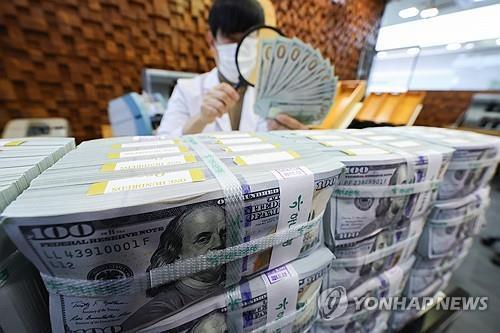- California Assembly OKs highest minimum wage in nation
- S. Korea unveils first graphic cigarette warnings
- US joins with South Korea, Japan in bid to deter North Korea
- LPGA golfer Chun In-gee finally back in action
- S. Korea won’t be top seed in final World Cup qualification round
- US men’s soccer misses 2nd straight Olympics
- US back on track in qualifying with 4-0 win over Guatemala
- High-intensity workout injuries spawn cottage industry
- CDC expands range of Zika mosquitoes into parts of Northeast
- Who knew? ‘The Walking Dead’ is helping families connect
S. Korea’s foreign reserves fall to 5-yr low in April: BOK
South Korea’s foreign reserves posted a monthly decline in April to reach the lowest level in five years amid the weak local currency, central bank data showed Thursday.
The country’s foreign reserves had stood at US$404.67 billion as of end-April, down $4.99 billion from a month earlier, according to the data from the Bank of Korea (BOK).
It marked the lowest level since April 2020, when the foreign reserves came to $403.98 billion.
Last month’s decline was due mainly to a currency swap agreement between the BOK and the National Pension Service, which calls for increasing the swap limit to $65 billion from $50 billion and extending the deal by one year to the end of 2025 in an effort to support the weak won.
The central bank also attributed the decline to a decrease in foreign currency deposits at financial institutions.
Foreign reserves consist of securities and deposits denominated in overseas currencies, International Monetary Fund reserve positions, special drawing rights and gold bullion.
In detail, foreign securities, such as U.S. Treasuries, had been valued at $356.5 billion as of end-April, down $5.03 billion from a month earlier. They accounted for 88.1 percent of foreign reserves.
The value of deposits also fell by $930 million to $23.23 billion over the cited period.
South Korea ranked as the world’s 10th-largest holder of foreign reserves at end-March.
China topped the list, followed by Japan, Switzerland, India and Russia, the data showed.













